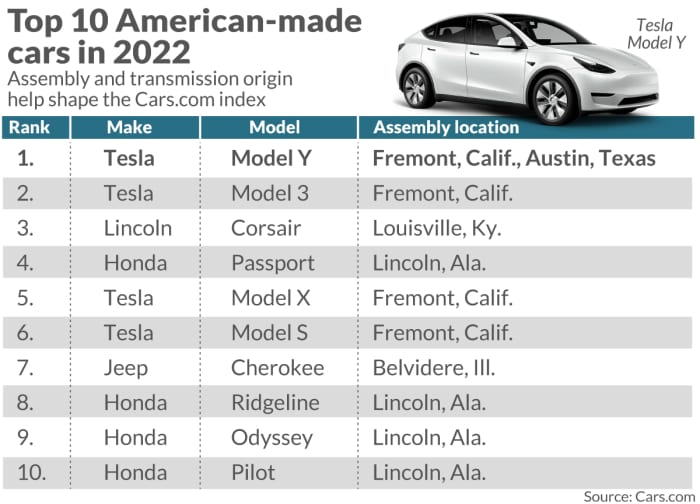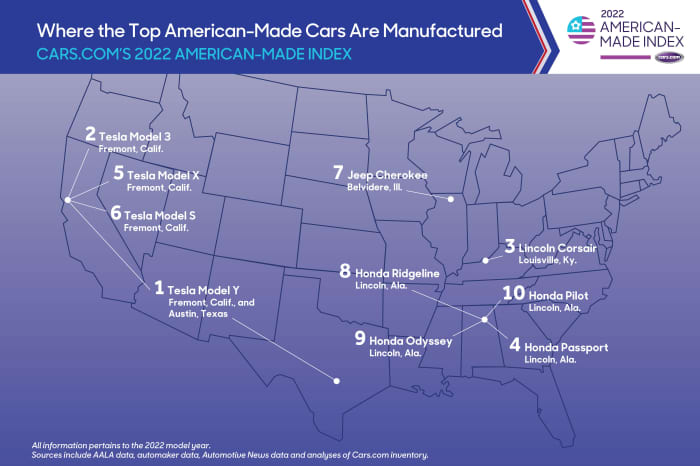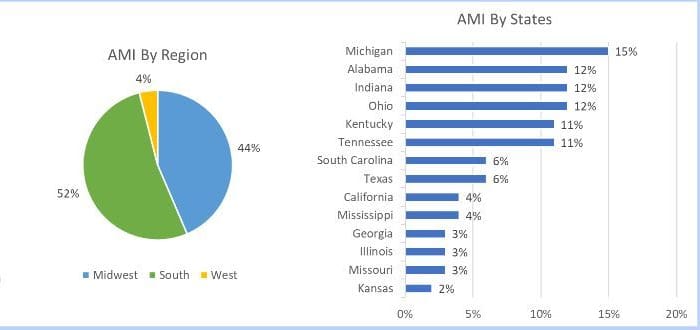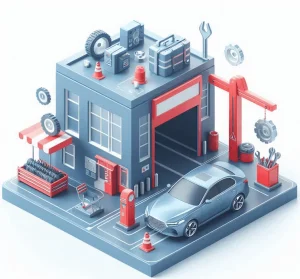Table of Contents
One Tesla model topped another to rank as the most “American-made” vehicle for 2022 in this long-running index that judges contenders based their U.S.-based assembly line, major parts sourcing and other features.
It’s Tesla’s
TSLA,
Model Y earning the No. 1 ranking from Cars.com this year, the auto listing and news site announced Tuesday.
The most American-made vehicle a year ago was the Tesla Model 3, the first time that an all-electric vehicle (EV) had claimed the top spot in the list that launched in 2006. The Model 3 scores in second place for 2022.
Related: The 2021 most ‘American-made’ auto is a first-timer in the top spot
View the complete list, including starting sticker prices. Check out the least-American cars and the most “American” by category.

Cars.com
Both Tesla EV options have climbed up the list only recently, owed to the fact that the Elon Musk-founded manufacturer liked to keep complete production data close to the vest until recently. Tesla’s stock trades down 31% in the year to date, but is up 16% compared to where it stood one year ago.
Read: Tesla stock has ‘gone on sale,’ according to one analyst. Here’s what investors should do
Surging pump prices, chip shortages
Jenni Newman, Cars.com’s editor-in-chief, said this year’s list hits during especially interesting market conditions for car buying: gas prices
RB00,
are soaring; curiosity in EVs and hybrid gas/plug-in options is on the rise; and global trade and supply chain tensions are refocusing consumers on what it might mean to be “American made.”
Don’t miss: Fourth of July travel: A record 42 million people expected to hit the road, despite high gas prices
“That Tesla — an American-made, all-electric make — appears frequently and high up on the list may indicate a coming alignment of market forces that could really explode once we break through microchip supply chain issues, especially if gas prices remain historically high,” Newman said.
“It also bodes well for other original equipment manufacturers (OEMs), including Honda
7267,
Ford
F,
and General Motors
GM,
working to diversify product lines with more EV and hybrid options,” she said.
Opinion: Gas prices are way up, but real cost of driving a mile was higher for most of the past century

This year, of the 379 vehicles available in the U.S. auto market, 95 made the Cars.com American-Made Index. Here are the top 10 and their assembly locations.
Cars.com
Making the cut
The Cars.com index is based on five factors: location of final assembly; percentage of U.S. and Canadian parts; country of origin for available engines; country of origin for available transmissions; and U.S. manufacturing employees relative to the automaker’s footprint.
This year, of the 379 vehicles available in the U.S. auto market, 95 made the index, with sourcing, production and assembly occurring primarily in Michigan (15%), Ohio (12%), Indiana (12%), Alabama (12%) and Tennessee (11%).

Cars.com American-Made Index (AMI) by location.
Cars.com
And just because a car is not American made does not mean it falls short on the features that make it desirable.
Perhaps the most prominent example from Cars.com’s perspective is the Ford Maverick, which it awarded both the Best of the Year 2022 and Best Pickup Truck of 2022 awards. It’s manufactured in Mexico.
Model variances can also make a difference. Ford’s EV, the Mustang Mach-E, shares a root nameplate with the 26th-ranked Mustang, but is an entirely separate vehicle also made in Mexico.
Cars.com explained it doesn’t rank fleet-only vehicles, nor models slated for discontinuation after the current model year without a U.S.-built successor. And the site will disqualify any vehicles for which it lacks confidence in the data, typically because they fall below minimum sales and inventory thresholds or aren’t yet on sale at the time of its research.
Amazon-backed
AMZN,
Rivian
RIVN,
another U.S.-based EV name, made a splash with a highly popular IPO last year. The stock has since dropped some 70% so far in 2022.
Rivian didn’t meet the Cars.com sales threshold this year as the Illinois-based EV maker is in the early stages of ramping up production, Newman explained.
“While they didn’t make it this year, when Rivian does increase production, it is certainly possible that we will see them show up big on future American-Made Indexes,” she said.
Consumer shift
The Biden administration and the leadership of major EV states, such as California, have made the push toward EV adoption and charger buildout a priority, part of a broader policy favoring a shift to renewable energy and reaching net-zero emissions by 2050. But the president’s critics have said U.S. reliance on imported parts may slow the U.S. job growth the White House claims can accompany rising EV popularity.
Read: The EV trend has just barely begun, as this JPMorgan chart of global disruptive trends tells us
Still, the private sector sees demand shifting. Ford has vowed to make electric vehicles 40% of its global sales by 2030, while GM said it will only offer EVs and not internal combustion engines by 2035.
For certain, greater charging capability and more competition, with a range of prices, will be key to adoption.
A recent Cars.com consumer survey found that year over year, affordability issues increased 15% as the most important attribute for car shoppers, both EVs and traditional gas-powered models.
What’s more, used car and truck prices have risen 16% over the past year, and 50% more than before the pandemic, according to industry data. In many cases, a used car is more expensive than a new one of the same model.
Read: U.S. retail sales fall for first time in five months. Is high inflation starting to bite?
Survey respondents considering an electric or hybrid vehicle also saw a double-digit bump, up 21% from 2021.
However, preference for American-made vehicles is the real story of late. Because of the COVID-19 pandemic and the shock to a global supply chain as the economy unevenly returned to normal, 40% of car shoppers say that buying a car built in America is now more important to them, up 22% year over year.





More Stories
Mercedes To Gradually Eliminate Manual Gearbox From 2023
Tesla Stock Vs. BYD Stock: Tesla Rebounds As China EV Rival Flashes Buy Signal
2022 Kia EV6 Review: One of the best EVs yet